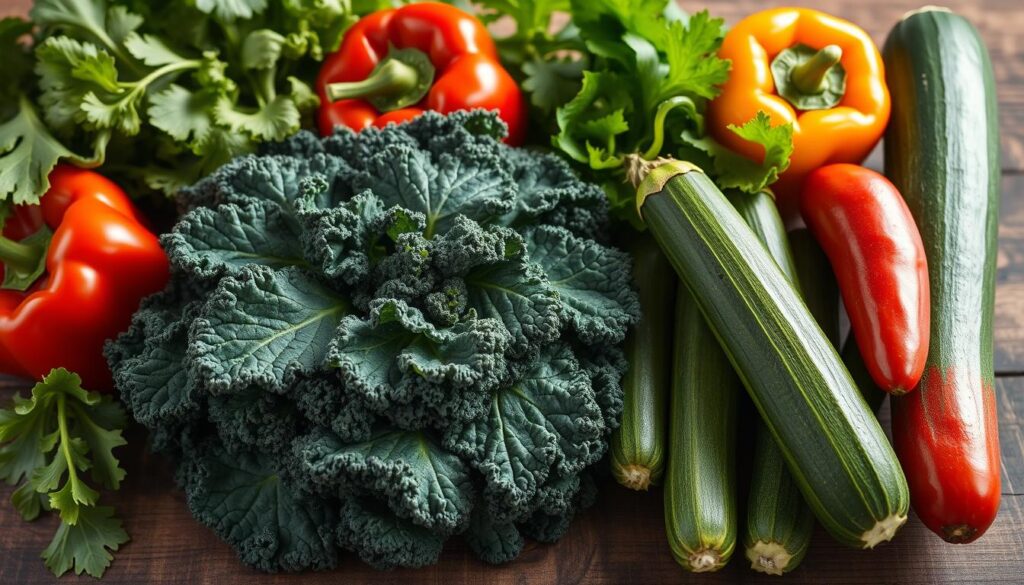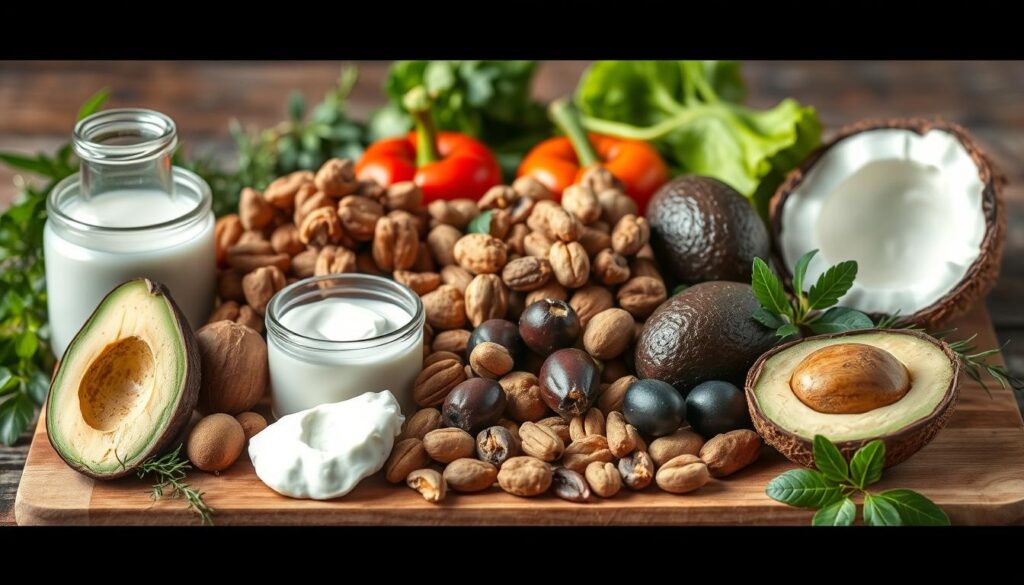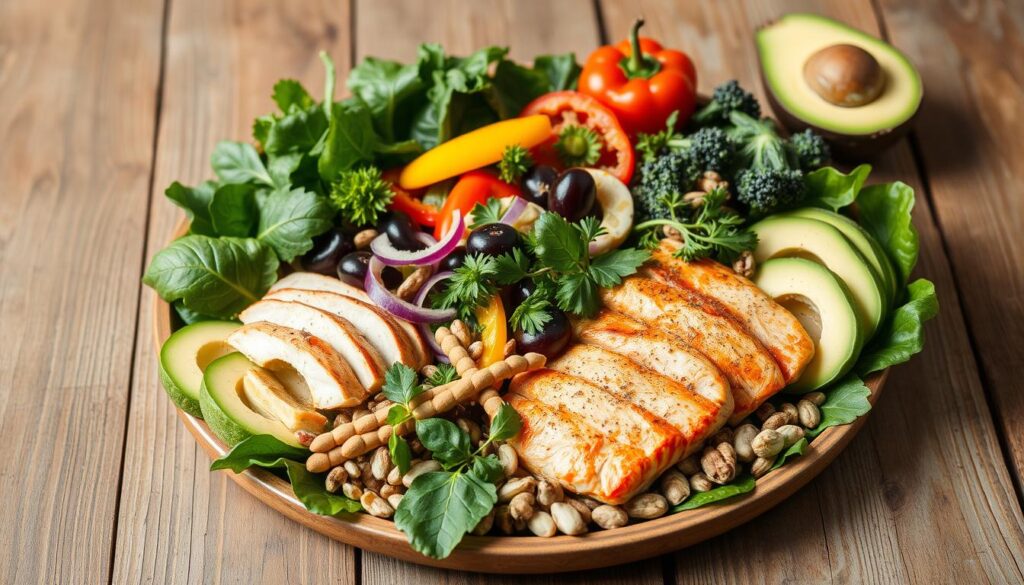Starting a low carb or no carb diet can change your health and weight. You might be on a keto diet, the Atkins plan, or just cutting carbs. Knowing which foods to eat is key. This guide will help you find low and no carb foods to reach your health goals.
Key Takeaways
- A low carb diet limits carbs to 20-50 grams a day.
- Meat, eggs, and seafood are great protein sources with low carbs.
- Leafy greens and cruciferous veggies have few carbs.
- Avocados, olives, and berries can be eaten in small amounts.
- Dairy like cheese and plain yogurt are low in carbs.
Understanding Low Carb Diets and Their Benefits
Low-carb diets are popular for healthy eating. They include the ketogenic diet, Atkins diet, and paleo diet. These diets cut down on carbs from grains, starchy veggies, and fruits. They focus on protein and healthy fats instead.
Different Types of Low Carb Approaches
These diets have different carb limits. They can be as low as 20 grams or as high as 130 grams. This range lets people choose how strict they want to be. The goal is to eat fewer carbs and use fat for energy.
Health Benefits of Reducing Carb Intake
Low-carb diets can help you lose weight and control blood sugar. They might also improve heart health. Research shows they can lead to more weight loss than low-fat diets, at least in the short term.
Understanding Net Carbs vs Total Carbs
It’s key to know the difference between net carbs and total carbs on a low-carb diet. Net carbs are what your body really absorbs. You get this by subtracting fiber from total carbs. This helps manage blood sugar and weight better.
| Dietary Approach | Daily Carb Intake |
|---|---|
| Very Low-Carb (Ketogenic) | 20-50 grams |
| Low-Carb | 50-130 grams |
| Moderate-Carb | 130-240 grams |
| High-Carb | 240+ grams |
Essential Protein Sources for Low Carb Diets
Keeping a low-carb diet balanced means focusing on protein. There are many tasty and healthy protein options. You can choose from lean meats, seafood, eggs, or plant-based proteins. Adding these to your meals helps your body and keeps carbs low.
Lean meats like chicken, turkey, and pork are great choices. A small skinless chicken breast has 31.1 grams of protein and 0 grams of carbs. Fish like salmon and tuna are also good, with canned salmon having 19.6 grams of protein and 0 grams of carbs per 3-ounce serving.
Eggs are full of protein, with 6.28 grams and less than 1 gram of carbs per large egg. For plant-based options, try tofu or hemp seeds. Tofu has 8.67 grams of protein and 1.55 grams of carbs per 3-ounce serving. Hemp seeds offer 9.48 grams of protein and 2.6 grams of carbs per 30-gram serving.
| Food | Calories | Carbs | Protein |
|---|---|---|---|
| Eggs (large) | 71.5 | 6.28 g | |
| Canned Salmon (3 oz) | 117 | 0 g | 19.6 g |
| Cheddar Cheese (1 oz) | 115 | 6.78 g | |
| Whey Protein Isolate (30 g) | 100 | 0 g | 25 g |
| Cottage Cheese (1 cup) | 183 | 10.8 g | 23.5 g |
Adding a mix of lean meats, fish, eggs, and plant-based proteins to your diet is key. It helps you meet your protein needs while keeping carbs low.
“Protein is an essential macronutrient for maintaining muscle mass, supporting immune function, and promoting satiety. Choosing the right protein-rich foods is key on a low-carb diet.” – Registered Dietitian, Jane Smith
Low and No Carb Foods: Complete Food List
Starting a low-carb or zero-carb diet doesn’t mean you have to give up taste or variety. There are many tasty, healthy foods with little to no carbs. This includes animal proteins, leafy greens, and some fruits. Let’s look at the full list of low and no-carb foods for your health goals.
Zero Carb Animal Products
Animal-based proteins are top choices for zero-carb foods. Beef, chicken, lamb, and pork have no carbs. Also, veal, venison, duck, hot dogs, sausages, deli meats, and most organ meats (except liver) are carb-free. Seafood like salmon, tilapia, tuna, catfish, trout, sardines, cod, bass, and haddock are great options too.
Minimal Carb Vegetables
Vegetables are key in a low-carb diet. Many are low in carbs. Leafy greens, broccoli, cauliflower, zucchini, and bell peppers are good choices.
Low Carb Fruits and Berries
Some fruits are low in carbs and okay in small amounts. Avocados, olives, strawberries, and raspberries are good picks. Nuts and seeds, like almonds, walnuts, and chia seeds, are also low in carbs and full of healthy fats and protein.
Choosing a low-carb or zero-carb diet can greatly improve your health. These foods are packed with nutrients and low in carbs. Try new recipes and find the best low-carb diet for you.
Vegetables That Fit Your Low Carb Lifestyle
If you’re on a low-carb diet, you’ll find many tasty non-starchy vegetables, leafy greens, and cruciferous vegetables. They’re low in carbs but full of vitamins, minerals, and fiber. These vegetable substitutes help keep you healthy.
Cauliflower is a great choice with only 5.5g of carbs per cup raw. It’s perfect as a low-carb substitute for rice or mashed potatoes. Zucchini, with 3.6g of carbs per cup raw, makes a tasty pasta alternative.
Leafy greens like spinach, kale, and arugula are full of nutrients. They’re low in carbs and good for you. Broccoli, cauliflower, and bell peppers are cruciferous vegetables that are low in carbs and high in fiber.
| Vegetable | Carbs per 100g | Fiber per 100g |
|---|---|---|
| Broccoli | 6.64g | 2.6g |
| Cauliflower | 4.97g | 2.0g |
| Zucchini | 3.11g | 1.0g |
| Spinach | 3.63g | 2.2g |
| Kale | 4.66g | 2.6g |
| Bell Peppers | 6.03g | 2.4g |
Adding these non-starchy vegetables, leafy greens, and cruciferous vegetables to your diet is smart. They make your meals tasty and healthy. You’ll feel full and have lots of energy all day.

Smart Dairy Choices for Low Carb Eating
Dairy can be great on a low-carb diet. It’s full of healthy fats, proteins, and nutrients. But, picking the right dairy is key. Let’s look at the best full-fat dairy, low-carb cheese, and yogurt and cream options for a low-carb lifestyle.
Full-Fat Dairy Options
Full-fat dairy like heavy cream, full-fat Greek yogurt, and full-fat cheese are good. They have fewer carbs and more healthy fats and proteins. This makes them a tasty and nutritious choice.
Cheese Varieties and Their Carb Content
There are many low-carb cheeses to pick from. For example, one mozzarella stick has only 1.3g of carbs and 7g of protein. It’s a great pick. Other cheeses like cheddar, parmesan, and Swiss also have less than 2g of carbs per serving. You can enjoy them as snacks or add them to your meals.
Yogurt and Cream Alternatives
If you’re looking for dairy alternatives, try plain, full-fat Greek yogurt. It’s packed with protein and has fewer carbs. Also, heavy cream and sour cream are low-carb and add creaminess to your food.
Always check the labels of dairy products. Make sure they fit your low-carb diet and don’t have added sugars or high carbs.
“Moderate intake of high-fat dairy products may not be so closely linked to heart disease, and may even reduce the risk of heart attack and stroke.”
Healthy Fats and Oils in Low Carb Diets
Following a low carb lifestyle means eating healthy fats and oils. These foods make you feel full, give you important fats, and keep you healthy. Here are some top choices for low carb diets:
- Olive oil: Extra virgin olive oil is full of good fats and antioxidants. It’s great for your heart.
- Coconut oil: Coconut oil has MCTs that help you lose weight by giving you energy.
- Avocado oil: Avocado oil has oleic acid, a fat that lowers cholesterol.
- Butter: Butter has a lot of saturated fat. But, eating it in small amounts might not harm your heart.
Other healthy fats for low carb diets include olives, nuts, seeds, and fatty fish like salmon. Adding these fats makes you feel full longer and gives you important nutrients.
| Fat Source | Nutrients | Potential Health Benefits |
|---|---|---|
| Olive Oil | Monounsaturated fats, antioxidants | Reduced risk of heart disease, improved cholesterol levels |
| Coconut Oil | Medium-chain triglycerides (MCTs) | Potential aid in weight loss, improved brain health |
| Avocado Oil | Oleic acid, monounsaturated fats | Reduced cholesterol levels, improved heart health |
| Butter | Saturated fat | Neutral or small association with heart disease risk |
Healthy fats are key in a low carb diet. But, eat them in small amounts to not get too many calories. Eating different healthy fats helps you stay balanced and happy with your low carb lifestyle.

“Healthy fats are the cornerstone of a well-formulated low carb diet. They provide essential nutrients, promote satiety, and can even support weight loss when consumed in the right amounts.”
Low Carb Snacks and Quick Meals
Staying on a low-carb diet doesn’t mean you have to give up taste or convenience. There are many tasty and healthy ways to eat without too many carbs.
Portable Low Carb Options
When you’re busy, grab these easy snacks:
- Hard-boiled eggs
- Cheese sticks
- Nuts like almonds, walnuts, or pecans
- Beef jerky – It’s low in carbs and high in protein.
Try pairing eggs or jerky with veggies like celery or bell pepper. It’s a tasty and easy snack.
Quick Low Carb Meals
Need a fast, low-carb meal? Try these:
- Salads with grilled chicken, steak, or salmon
- Veggie stir-fries with protein like shrimp or tofu
- Bunless burgers or lettuce-wrapped burgers
These meals are quick and keep you full with protein, healthy fats, and fiber.
With a bit of planning, you can enjoy tasty low carb snacks and quick low carb meals anytime.
| Snack | Carbs (g) | Protein (g) |
|---|---|---|
| Cheddar cheese crisps (1 oz) | 0.6 | 8 |
| Deviled eggs (2 eggs) | 0.6 | 12 |
| Tuna salad lettuce wraps (3 oz tuna) | 1 | 25 |
| Berries and whipped cream (1/2 cup berries) | 12 | 2 |
| Stuffed avocado (1/2 medium avocado) | 6 | 25 |
Beverages Allowed on Low Carb Diets
Choosing the right drinks is key when you’re on a low-carb diet. Water, coffee, and tea are great picks because they have almost no carbs. Unsweetened sparkling water is also a tasty, low-carb choice.
If you like to drink alcohol, dry wines and low-carb beers are okay in small amounts. But watch out for drinks with lots of sugar. Pick zero-sugar or low-carb options instead.
Milk alternatives like almond or coconut milk are good if they’re unsweetened. Energy drinks and sports drinks with natural sweeteners are also good choices. These drinks help you stay hydrated and support your health goals.


A Life-Changing Experience with This Weight Loss Supplement (Nagano Tonic)
I’ve always struggled with finding a weight loss solution that actually works for me. Like many, I’ve tried numerous diets, exercise routines, and supplements over the years—some worked for a short time, but nothing ever gave me long-term results. That was until I decided to try the weight loss supplement I found : Link to the Supplement.
From the moment I started using it, I noticed a difference. Not only did I feel more energized, but my cravings also became more manageable. The best part? I started seeing results much quicker than I anticipated! Over the course of just a few weeks, I noticed a significant reduction in belly fat and overall weight loss that I hadn’t been able to achieve before.
What makes this supplement stand out from all the others I’ve tried is how it supports me in my daily routine without any jitters or energy crashes. I’m able to stay focused and motivated, which has made it easier to stay on track with my diet and exercise plan.
This product truly exceeded my expectations, and I feel more confident and healthier than ever before. If you’re struggling with your weight loss journey like I was, I highly recommend giving this supplement a try. It’s been a game-changer for me, and I’m sure it can work wonders for you too!
Contant Them on email .. tonicnagano50@gmail.com
I’ve tried so many weight loss products over the years, but nothing worked like this supplement! Since I started using it, I’ve noticed a big difference in my energy levels and appetite control. In just a few weeks, I’ve lost weight and feel so much better. It’s been easy to stick with, and the results speak for themselves. Highly recommend this to anyone looking to make a real change!
wasn’t sure what to expect, but this weight loss supplement has really impressed me! After just a few weeks of use, I’ve already dropped a few pounds and feel more motivated to stay active. It’s helped curb my cravings and boosted my energy throughout the day. I’m excited to keep going and see even better results. Definitely worth trying!
Reach them on tonicnagano50@gmail.com
I was skeptical at first, but this supplement has truly made a difference in my weight loss journey. I’ve lost weight without feeling deprived or sluggish. My cravings are under control, and I feel more confident in my body. It’s easy to incorporate into my daily routine, and the results speak for themselves. I’m so glad I gave it a try!
Thanks David, i do use the link to make my purchase. you can get too here http://surl.li/iasppy
I’ve tried so many weight loss products, but this one has been by far the most effective. In just a few weeks, I’ve noticed a visible difference in my body and energy levels. It’s helped me stay on track without the constant hunger pangs and cravings. I’m really happy with my progress and can’t wait to see where I’ll be in another month!
This Nagano Tonic has been amazing! In just a few weeks, I’ve lost weight, feel more energized, and my cravings are under control. Highly recommend it!
Thats the link to purchase http://surl.li/iasppy